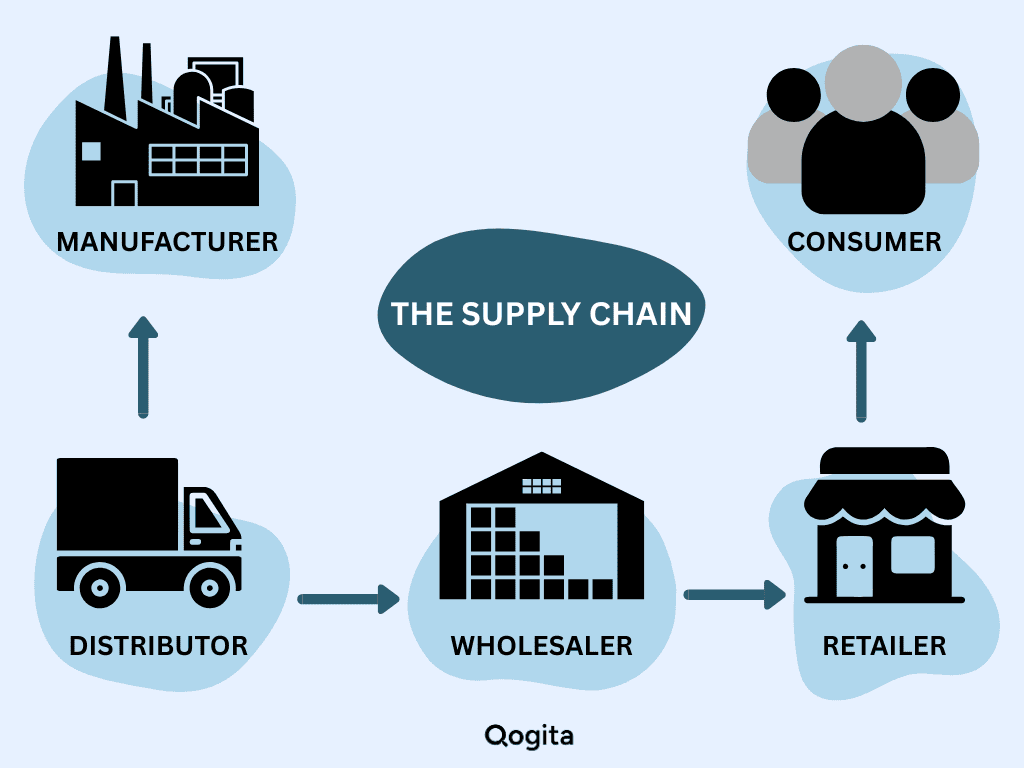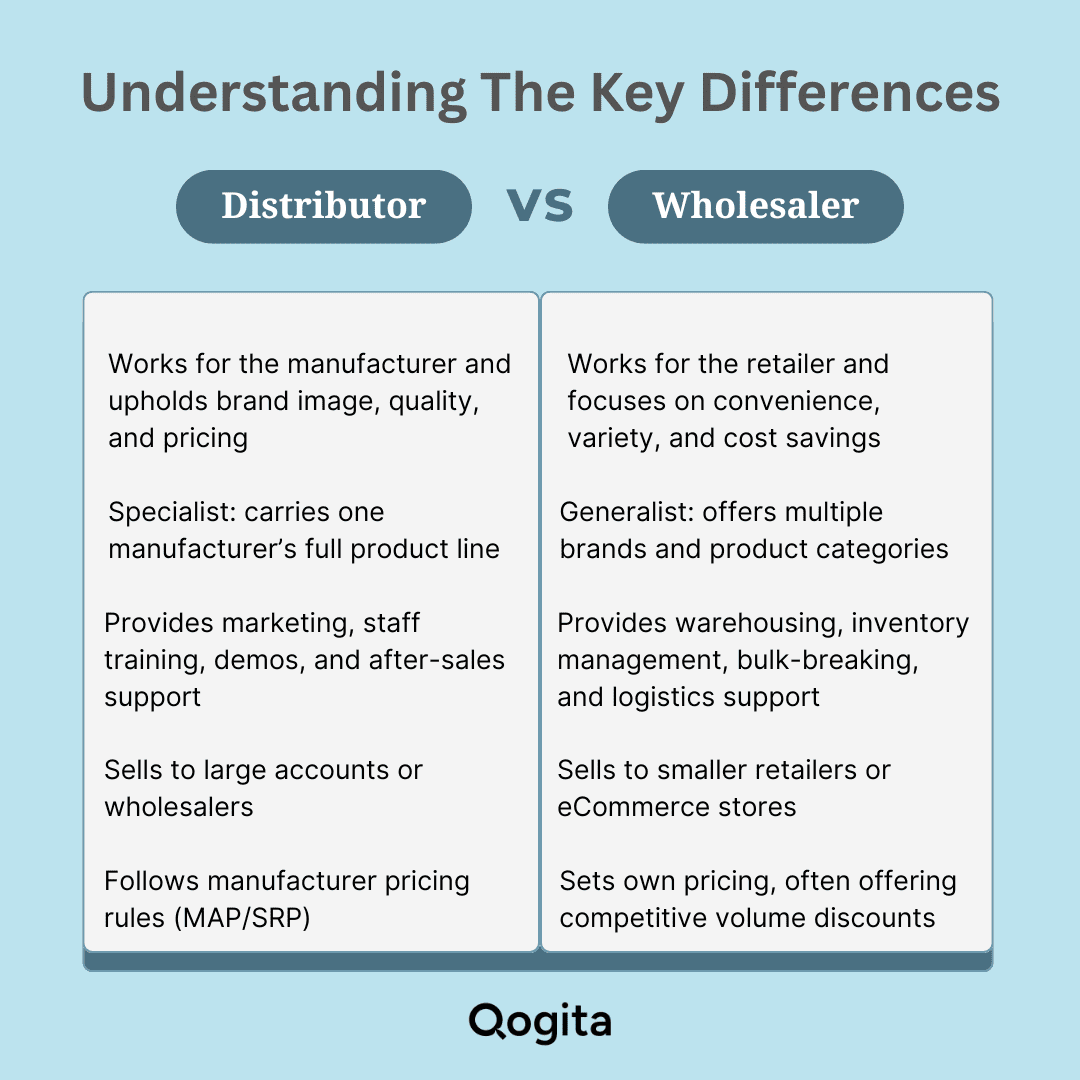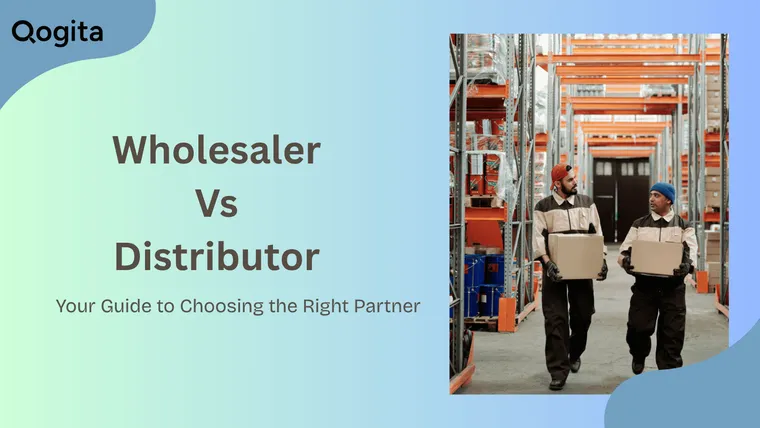Behind every product on a shelf or online store there is a complex network of businesses working together. From manufacturing and packaging to storage and distribution, each step keeps the supply chain moving smoothly. But two terms that often cause confusion are wholesale vs distributor.
If you’re a retailer or eCommerce seller, knowing the difference can make a big impact on how you source products and set prices.
So, what's the difference between wholesalers and distributors? Are they the same thing? Do they offer the same service? Let’s take a closer look.
What is a Supply Chain?
To set the stage, let's briefly look at the journey of a product. The supply chain is the full pathway, starting with raw materials and ending with the consumer.
In traditional logistics, the movement of goods relies on a chain of specialisation:

The distributor and the wholesaler form the core of the middle market. Their shared primary job is to purchase in massive quantities from the manufacturer, take possession, and resell in smaller quantities.
This efficiency allows manufacturers to focus solely on production, while retailers get the variety and amounts they need without dealing with complex factory ordering.
Now, let’s clearly define the specific roles that distinguish wholesalers from distributors.
What is a Wholesaler?
In simplest terms, a wholesaler is a volume buyer. This is a business that purchases goods in massive quantities from a variety of manufacturers, agents, and other distributors. Then it resells those goods in smaller, yet still substantial, bulk orders.
Ultimately, the wholesaler works primarily in the interest of the buyer (the retailer). Their primary focus is on providing a wide variety of products at the most competitive prices through their sheer buying power.
The wholesaler's job is largely transactional and focused on logistics: they manage stock, warehouse inventory, break bulk, and fulfil orders.
If a retailer needs 10 different brands of hygiene products, for instance, they turn to a wholesaler to place a single, convenient order.
What is a Distributor?
The distributor is fundamentally different from the wholesaler. They are a manufacturer's dedicated sales partner. Answering what is a distributor requires seeing them as an extension of the brand itself.
The key to their role is exclusivity. A distributor signs a formal contract with a specific manufacturer, which gives them the sole right to sell and support that particular product line within a defined regional territory.
Their job is highly strategic, not just transactional. They manage regional logistics, marketing, product training, and even after-sales support on behalf of the brand.
Wholesaler and Distributor Explained With Example
Imagine one beauty brand that makes skincare products in Italy. Instead of selling directly to hundreds of retailers, the brand partners with a distributor in Europe. That distributor manages everything for the beauty brand, from import paperwork to marketing support.
Once those products are established in the region, wholesalers step in. They purchase goods in bulk from distributors and resell them to smaller retailers, salons, and eCommerce stores across the UK and Europe.
Retailers benefit because they can buy different brands from a single trusted source, rather than dealing with multiple suppliers.
This system keeps the flow of goods smooth. Distributors help brands grow, and wholesalers make those products accessible to retailers and online sellers.
What’s the Difference Between Wholesale and Distributor?
The critical divide between these two partners is best understood by looking at the specific value they deliver, who they serve, and the nature of the relationship they build.

Relationship and Loyalty
The main difference is who they work for.
The distributor enters into a binding contract to serve the manufacturer/brand, acting as an exclusive, long-term sales arm dedicated to market penetration.
They are therefore responsible for upholding the brand’s image, quality standards, and strategic pricing in a given territory.
The wholesaler, on the other hand, has no contractual tie to any single manufacturer. Their loyalty is to the buyer (the retailer) and they focus on aggregating the best possible selection of products from a mix of sources. They prioritize the buyer's convenience and cost savings above brand strategy.
Scope and Product Range
A distributor is forced to be a specialist. Due to their exclusive contracts, they maintain a very narrow, deep product range, carrying only one manufacturer's entire line.
This constraint is purposeful: it ensures they become deep technical experts on that product's specifications, integration, and use.
A wholesaler, however, is a generalist. They aggregate large inventories across multiple product categories and competing brands to create a single-source solution for retailers seeking many different types of goods.
Value-Added Services
Distributors provide proactive, strategic services—the kind a manufacturer would typically handle in-house.
This includes managing localized marketing campaigns, offering training to retailer staff, setting up complex product demos, and maintaining after-sales and warranty support.
Wholesalers offer passive, logistics-focused services: warehousing, inventory management, freight consolidation, and simple bulk-breaking. They provide essential movement and storage but generally offer no specialized technical or strategic sales support.
Market Position and Customers
As we have already seen in the supply chain, the distributor sits higher, selling directly to the largest accounts, such as major national retail chains or even to wholesalers themselves. They focus on establishing the brand's primary channel.
The wholesaler sits one step lower, focusing on selling smaller, aggregated bulk orders to smaller or independent retailers who need convenience and lower Minimum Order Values (MOVs) to stock their diverse stores.
Wholesale vs Distributor Pricing: Who Controls the Cost?
Pricing is one of the most significant distinctions for a buyer.
- Distributors operate under pricing restrictions. Because they are an extension of the manufacturer, they must frequently adhere to Minimum Advertised Price (MAP) policies or Suggested Retail Price (SRP) guidelines set by the brand. Their profit is typically tied to negotiated margins or commissions.
- Wholesalers, on the other hand, have greater autonomy. They buy goods outright and are free to set their own pricing, often resulting in more competitive volume discounts, as their focus is purely on rapid inventory turnover.
If your business values brand support, regional services, or long-term partnerships, distributors may justify the higher price.
But if your priority is low-cost purchasing in bulk and flexible sourcing, wholesalers are usually the better choice.
The Similarities Between Wholesaler and Distributor
Despite the key differences in their allegiance and strategy, distributors and wholesalers share some functions that classify them both as essential merchant intermediaries in the B2B supply chain.
Inventory Risk and Ownership
Both parties operate as Merchant Middlemen. This means they take legal ownership (title) of the goods they purchase from the manufacturer.
By buying and stocking goods in bulk, both the distributor and the wholesaler immediately absorb the financial risk of holding inventory, including potential spoilage, obsolescence, and changes in market price. This is a critical service provided to the manufacturer.
Logistics and Bulk-Breaking
Their primary shared operational function is simplifying logistics. Both buy products in massive economies of scale (truckloads, containers) from the factory and perform the necessary function of bulk-breaking.
They store this inventory in their own warehouses and then sort, repackage, and ship smaller, manageable orders to their respective customers (retailers, smaller businesses, or other intermediaries).
This process saves every downstream buyer from having to deal with the logistical complexity of the factory.
B2B Focus and Position in the Chain
Both are focused on the Business-to-Business (B2B) transaction model. They function as a necessary link between the producer and the final seller (the retailer), meaning neither typically sells directly to the end consumer.
They ensure the product moves from the point of creation to the point of retail with maximum efficiency and minimal disruption.
Wholesale vs Distributor: Choosing Your Partner in a Modern B2B Market
Now that the differences and similarities between wholesalers and distributors are clear, you must be wondering, "Which one should I go with?"
Choosing the right partner depends entirely on your specific business needs, whether you are a manufacturer seeking market reach or a retailer looking for inventory.
When to Partner with a Distributor
Choose a distributor when your primary objective is strategic growth, brand control, and value-added expertise.
When to Partner with a Wholesaler
Choose a wholesaler when your primary objective is cost reduction, inventory convenience, and variety.
How to Find the Right Wholesaler
Finding the right wholesaler can make or break your retail or eCommerce business. The ideal partner helps you source quality products, maintain healthy profit margins, and keep your inventory consistent.
But with so many suppliers in the market, it’s important to know what to look for.
Product Authenticity and Brand Range
Work with wholesalers that guarantee genuine products from trusted brands and sources. Authenticity is very important in the beauty and personal care industry, where counterfeit or grey-market goods can damage customer trust.
At Qogita, we focus exclusively on verified suppliers to guarantee product authenticity across the platform.
Pricing and Minimum Order Requirements
Look for partners who demand pricing transparency so you can calculate your margins without any guesswork. It's very important to find low or flexible Minimum Order Values (MOVs), as you can't afford to tie up all your money in inventory when testing new products.
Consider partners who negotiate aggressively. Qogita, for example, negotiates on your behalf, so your business can access the bulk prices usually reserved only for massive retail chains.
Reliability and Logistics
Timely delivery and clear communication matter just as much as pricing.
Select wholesalers with efficient fulfillment systems and reliable shipping services across the UK and Europe. Centralized online marketplaces like Qogita simplify this by allowing you to source from multiple suppliers in one place, with consolidated shipping and straightforward logistics.
Platform Support and Flexibility
A strong wholesaler-retailer relationship goes beyond transactions. The best wholesalers offer customer support, automated invoicing, and easy product discovery tools to save you time.
Qogita’s marketplace makes it simple to browse products, compare offers, and manage all your orders in one dashboard.
Conclusion
Finally, the choice between a wholesaler and a distributor depends on what your business goal is.
The distributor is a strategic brand partner, as they have expertise and exclusive support to grow a specific product line. The wholesaler is a transactional partner, offering variety, price flexibility, and logistical convenience.
Modern businesses must look past the title and evaluate the supplier's contractual loyalty, depth of services, and pricing autonomy to secure the most advantageous position in the supply chain.
Wholesale vs Distributor FAQs
What is the difference between a distributor and a wholesaler?
The main difference lies in loyalty and scope. A distributor is a strategic partner with a contract to represent and promote a single manufacturer's brand. A wholesaler is a transactional partner who buys and sells products from many competing brands to retailers.
What differentiates wholesale vs distributor vs retailer?
These roles are defined by their place in the supply chain. A distributor works directly for the manufacturer to push a specific brand into a region. A wholesaler buys goods in bulk from distributors or manufacturers and sells an assortment to businesses. A retailer is the final step, selling small quantities of goods directly to the end consumer.
What is a wholesale distributor?
A wholesale distributor (or wholesale-distributor) is a term used in the modern market to describe an intermediary that performs functions of both roles. They buy, store, and resell goods in bulk (wholesale function) but may also hold exclusive contracts for certain product lines, requiring them to provide specialized service and marketing (distributor function).
What are the three types of distributors?
Distributors are generally grouped by their level of control or service: Exclusive Distributors (sole right to sell in a region), Selective Distributors (authorized to sell within specific channels/criteria), and Value-Added Distributors (VADs), who offer services like financing, integration, or custom manufacturing.

